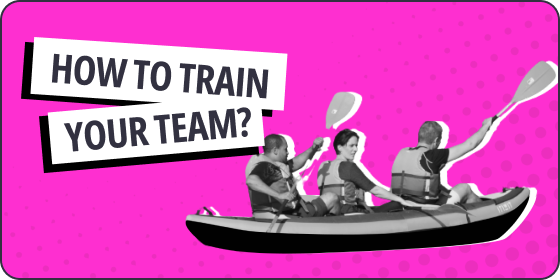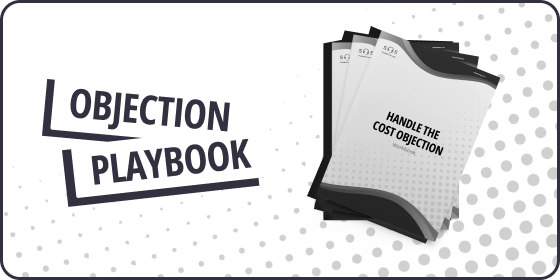What should I Train my Team on?

It’s aways important for us to mention, that every industry and every business is different. Ultimately there will always be unique nuances when selling different products or services, but if you are struggling to outline the key areas to train your Team, this is a helpful guideline to at least build a baseline of what topics to cover. There are 3 main pillars of Training, and they come in order of importance. It starts with giving your Team the knowledge they need to do their job. Once they have the knowledge, you should then teach them the skills they need to convey that knowledge. Finally, once they have the knowledge and the skillset, they need a structure deliver it. In this context, a structure is a clearly defined selling process.
Now that you understand the 3 key pillars, it’s important to note there are a lot of subheadings that fall into each of these pillars. Again, based on the unique selling points your business has when selling your product/service, the below should be different, but these can be used as a guideline.
1. Knowledge
- Product Knowledge – Train your Team to be experts on the product they are selling.
- Industry Knowledge – Educate them on your industry, how your product became a need, and how the industry has evolved.
- Competitor Knowledge – Teach your Team about every single one of your competitors, and why your product is different as well how to sell against those competitors.
- Tech stack education – Train them on the technology (CRM’s, Sales Enablement, LinkedIn, and other applications you have access to) and ensure they know how to use them.
- Sales Techniques – Train your sales Team on the fundamentals of sales, like how to build rapport, how to build trust, how to find pain & how to create a need. Teach them how to prepare for a meeting.
2. Skills
- Soft skills – Train your Team on their emotional intelligence, their adaptability, their Teamwork & their interpersonal skills.
- Communication skills – Train your team on the basics of listening, writing emails and delivering presentations, and the different forms of interacting with their prospects.
- Objection handling – once your Team has the knowledge of how to handle the objections, teach them on how to handle the objections in an objective non defensive way.
- Negotiating – Train your Team on holding the value, what they can negotiate with, and help them understand that negotiating is a give and take.
- Time management – Train your Team on low impact versus high impact activities. Show them where and how they should be spending their time. Teach them about revenue generating activities versus non-revenue-generating activities.
- Problem-solving – Train your Team on how to go about dealing with problems. It shouldn’t be you as the Leader addressing every problem they have, it should be you encouraging them to bring a problem, and a potential solution to you. You need to create a self-sufficient culture in your Team.

3. Structure
- Defining the role and expectations – Train your Team on what success looks like in the role, and be as crystal clear around expectations from day one. Explain to them what your leadership style will be when they are performing well, and what your leadership style will be when they are behind. Ask them what style of leadership and communications they prefer.
- Set goals and objectives – Give your Team goals and objectives, both individually, and as a Team. It’s important to communicate why you’re doing this, and what happens when you achieve or do not achieve those goals/objectives. Make sure every goal and objective have a timeline against it.
- Delivery methods – Of course we know the mediums like over the phone, via email, via text or via Social Media’s, but what communications should be delivered via what medium. For example, a great rule would be to not handle any difficult objections via email. That needs to be addressed on a call or in person. Once your Team has the knowledge and the skills, you need to Train them on what information can and cannot be communicated via certain mediums.
- Sales methodologies – depending on your industry and your sales process, you might want to implement a sales methodology. Some popular ones include MEDDPICC, Sandler or Spin Selling. There are many more systems like this, but these systems all promote structure within the sales cycle, a lot of modern SaaS companies will operate like this. Each system has its advantages, and it’s disadvantages, however operating in a system like this will require a lot of Training to set your Team up for success.
- Sales Processes – Unless you are in a start up environment, every company should have a clear and defined sales process. Train your Team on exactly what that process looks like from start to finish. For example, identify potential customers, contact them, book a meeting, run a demo, run a trial, handle objections, negotiate, close the sale, onboard the customer, renew the customer. Whatever that process looks like, ensure that every person on your Team is Trained on each step of the process.
- Support functions – Train your Team on the access they have to internal support, whether it’s a designated support function, or a ticketing or IT Team. Explain on day one how they would go about getting support internally that is not you.
- Regularly review and evaluate – A huge part of structure for your Team is the dedicated 1 to 1 meeting. Whether these meetings are weekly, or bi-weekly, monthly or quarterly, these 1 on 1 leader to subordinate meetings are crucial for success. This is an opportunity for both parties to review and evaluate the success or areas of opportunities for the salesperson. These meetings should be recurring invites in the calendar.
Whether you are new to leadership, or if you are a veteran of the role, this document can often serve a checklist for what you should be Training your Team on. If you’re checking a lot of the above boxes, you will find yourself in a strong place as a Team.



























